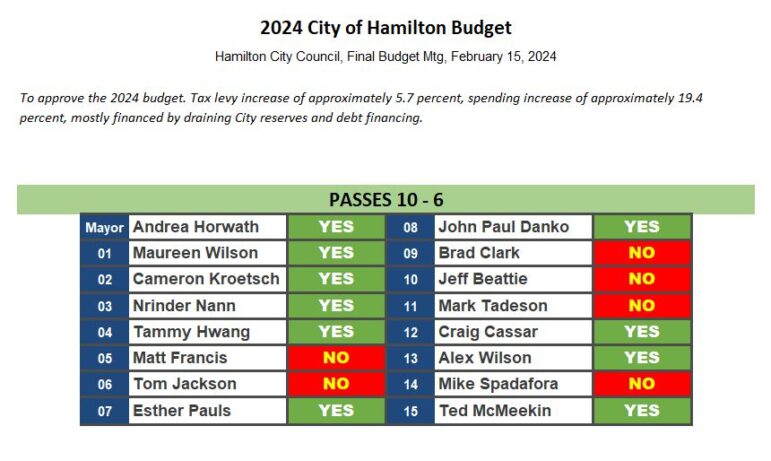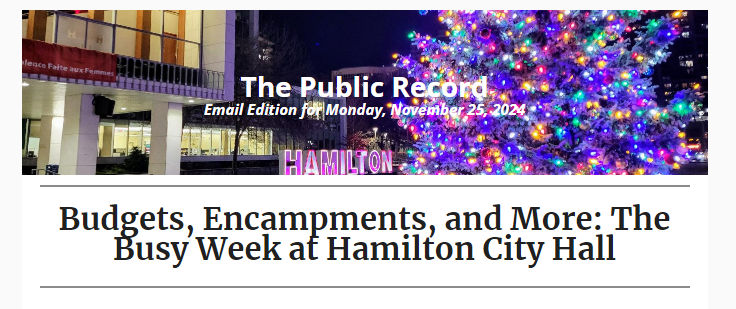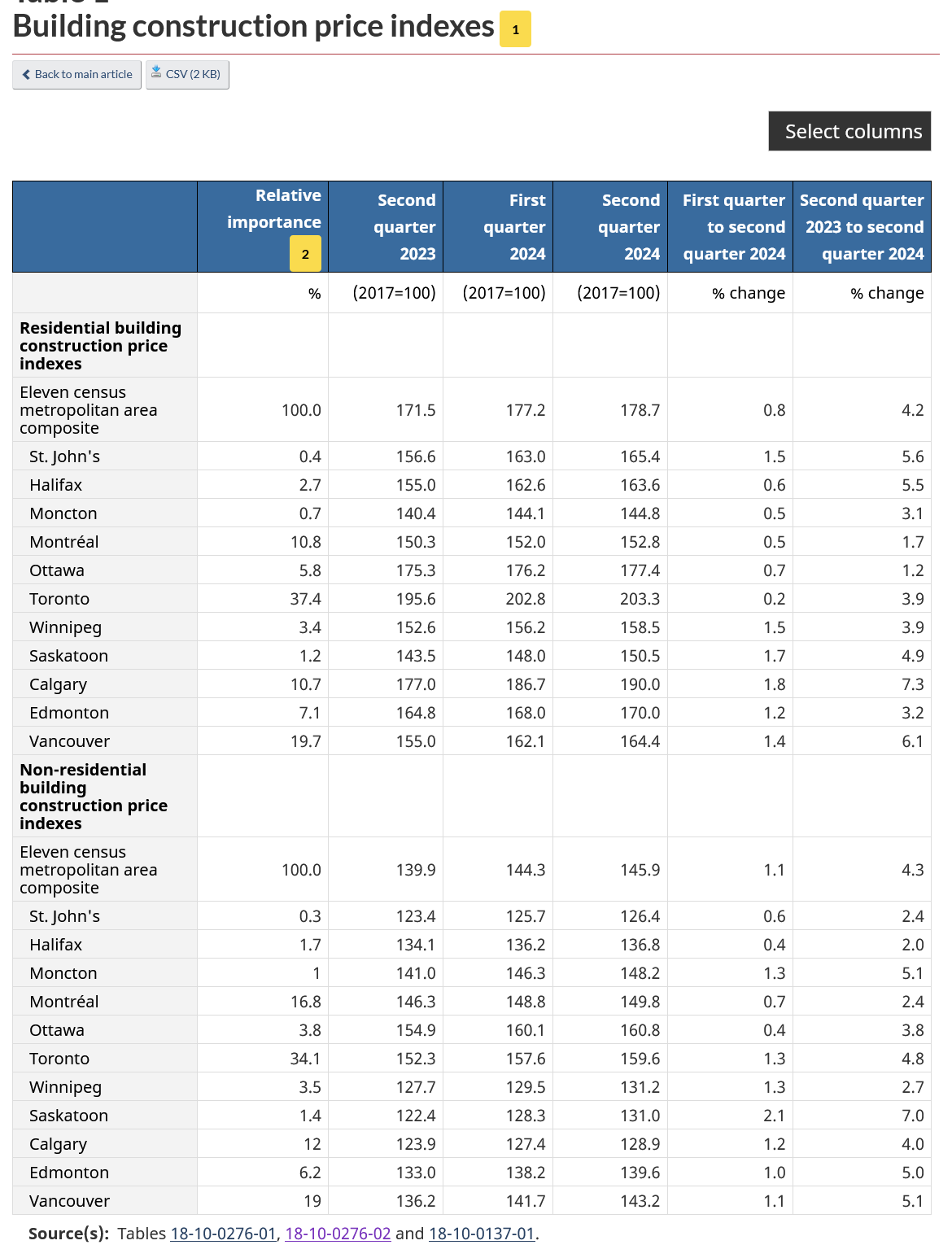The City of Hamilton still doesn’t know how much it spent in 2023, is unsure how much it spent in 2024, and is now late starting the 2025 budget process.
The ongoing impact of February’s cybersecurity failure will overshadow the 2025 budget process, the costs are already in the tens of millions and will only grow.
On October 28, Mayor Andrea Horwath began the budget process with the required mayoral directive. Summed up, the Directive states the budget should meet needs while finding means of lowering the tax levy increase.
In 2024, Hamilton increased budgeting spending by 19.4 percent, but only increased the tax levy by 5.7 percent, The gap was filled by taking from reserves, using debt financing, and other accounting methods.
Key Dates
| AGENDA | DATE |
|---|---|
| Public Delegations | November 18, 2024 at 3 pm |
| Rate Supported Budget | November 22, 2024 at 9:30 am November 28, 2024 at 9:30 am (if required) |
| Targeted Rate Budget Approval (Regular Council Meeting) | December 11, 2024 at 9:30 am |
| Public Delegations | January 20, 2025 at 3 pm |
| Tax Supported (Operating & Capital) Budget Overview | January 23, 2025 at 9:30 am |
| Boards & Agencies Presentations | January 28, 2025 at 9:30 am |
| Housing & Healthy and Safe Communities Budget Presentations | January 29, 2025 at 9:30 am |
| Corporate Services & City Manager’s Office Budget Presentations | January 30, 2025 at 9:30 am |
| Planning & Economic Development & Public Works Budget Presentations | January 31, 2025 at 9:30 am |
| Budget Deliberations | February 7, 2025 at 9:30 am |
| Targeted Tax (Operating & Capital) Budget Approval (Council Meeting) |
February 12, 2025 at 9:30 am |
There is one remaining opportunity for public delegations on January 20.
Delegations must register in advance on the City website. City Council no longer permits walk-o
What We Don’t Know
Total Spending Projection for 2025: The City has only released its estimated net tax levy increase, without providing estimated total spending. Total spending is not expected to be public until January.
2023 and 2024 Spending Variances: The City’s 2023 audit is ongoing, the CIty still does not know how much it spent in 2023. The City’s financial tracking systems have not yet been restored following the February cybersecurity failure.
2023 Audit Not Complete: There is no timeline for the City to complete its 2023 audit.
2023 Financial Return Not Complete: Ontario’s 444 municipalities must submit annual financial returns to the Ministry of Municipal Affairs. Hamilton is the only large municipality yet to file its 2023 return.
The Hamilton Police budget: The Hamilton Police Services Board is holding closed-door meetings to determine how much they will increase their budget request for 2025. In other communities, police services are seeking double-digit percentage increases.
Under new provincial regulations, council members who sit on police boards are strictly prohibited from opposing budget increases. On Friday, Mississauga Mayor Carolyn Parrish resigned from the Peel police board – saying she cannot support a 21.3 percent increase to the Peel Police budget.
What We Know
The Budget Political Game: The budget is a process that follows the same script each year. The initial tax increase estimate is a higher number than what the final number will be. In February, an 8.2 percent tax levy increase projection was given. This week, the “projection” is 5.8 percent, with a listing of new spending items returning it to 6.9 percent.
Debt interest pressures: $20.41-million in additional funding is needed to service new debt the City has taken on this council term.
Inflation
Municipal capital costs continue to increase more than general inflation, which is measured by CPI.This ‘municipal inflation’ is a significant budget pressure.
Past City Councils have allowed Hamilton’s infrastructure to fall apart – the bill is due and higher than ever.
The Consumer Price Index measures the costs of goods and services consumed by individuals and households (e.g., food, shelter, household operations, transportation, recreation, fuel, etc.).
The latest CPI figure is 1.6 percent. [It was as high as 2.9 earlier this year.]
Municipalities’ costs differ significantly from consumers.
No measure calculates inflation across the major cost categories of municipalities.
Salaries and benefits are the largest cost drivers for municipalities.
Construction costs are another: both skilled labour and materials.
Building Construction Price Index: The Toronto non-residential BCPI increase rate is 4.8 percent, year-over-year for Q2, comparing 2024 to 2023.
This is more than triple the CPI rate.
Asphalt Prices Stabilized: Ontario’s Ministry of Transportation tracks the price of performance graded asphalt cement. This year’s prices have averaged near 2023 costs. The 2023 peak price was $1216,80 per tonne in June 2023. The 2024 peak, thus fare, was $1172.10 in July.
Budget Decisions To Be Practical and Pragmatic or To Be Political:
It is a cliche to write budgets are hard, that decisions need to be made, you get what you pay for, and this is the most important budget ever. Let’s put those on the table and move on.
 Budget votes have been 10-6. Will that change, and is the budget at risk?Ward 5 Clr Matt Francis, Ward 6 Clr Tom Jackson, Ward 9 Clr Brad Clark, Ward 10 Clr Jeff Beattie, Ward 11 Clr Mark Tadeson, and Ward 14 Clr Mike Spadafora voted against both the 2023 and 2024 budgets.
Budget votes have been 10-6. Will that change, and is the budget at risk?Ward 5 Clr Matt Francis, Ward 6 Clr Tom Jackson, Ward 9 Clr Brad Clark, Ward 10 Clr Jeff Beattie, Ward 11 Clr Mark Tadeson, and Ward 14 Clr Mike Spadafora voted against both the 2023 and 2024 budgets.
Francis will oppose the budget.
Jackson will work to get all the spending increases he wants included in the budget, then posture and vote against the budget.
Clark does not add much spending to the budget, will speak about efficiencies during debate, and will warn that the City’s practice of creative financing will eventually catch up with it. It is unlikely he will vote for the budget due to the use of creative accounting.
Beattie is bloc voting with Clark and Francis on key votes such as the budget. He’s voted against each budget since being elected, and nothing is indicating that will change.
Tadeson‘s opposition to the last two budgets has been grounded in concerns about the growth in the size of the City’s management staff, the decision to grant significant pay increases to managers, and the continued hiring of consultants on top of all of this.
Speaking with me last week, Tadeson stated he can support a pragmatic budget. He’s been trying to get the City’s spending on consultants under control.
Spadafora will vote no, but first, he’ll ensure funding is added to the budget to begin work towards a new Ward 14 library branch and to study lane expansions on the Linc.
At this time, it is looking to be another 10-to-6 vote.
Municipal Budgets Projects Across Ontario:
Editorial Note: Due to the complexities of calculating combined lower and upper-tier levy estimates, I’m only noting single-tier municipalities at this time.
Windsor expects a high property tax increase: after years of allowing infrastructure to deteriorate while artificially holding taxes low, the bill is coming due in Windsor. The populist mayor, Drew Dilkins, is beginning the budget process by creating sub-committees to ‘find savings.’ Following the typical political budget playbook, Windsor’s council keeps finding “savings” to “lower” the tax increase.
Ottawa mayor wants only to increase taxes by 2.9 percent, calls on other governments to fund $120-mil transit deficit: the City of Ottawa’s 2025 budget is underway. Their transit agency is running a significant deficit, and the mayor said he was prepared to increase transit fares by up to 75 percent or cut service. The draft budget includes higher than usual fare increases.
Guelph uses accounting to get to a “four percent” tax levy increase: Guelph has ended its multi-year budgeting plan. Last November, Guelph Council passed a four-year budget with a 9.80 percent tax increase for 2015. Now, Guelph’s mayor is saying he will cap the levy increase at no more than four percent. Guelph will rely “heavily on inter-reserve fund borrowing,” deferring approved projects, and accounting methods to push pressures onto future council terms to achieve this lower levy increase. Guelph’s council will start its budget meetings with a closed session on October 30.
London’s multi-year budget planning for 8.7 percent levy increase: On paper, having passed a four-year budget last year, London Council is scheduled to make relatively minor adjustments. Postmedia outlines the process. (London has “lowered” the levy increase to 7.4 percent)
Orillia 6.94 percent net levy estimate: according to the City’s budget press release.
Peterborough 7.8 percent net levy estimate: according to the CIty’s budget press release. Read more: coverage by the Trent University student newspaper.
Niagara Police ask for a 15.1 percent budget increase: Niagara’s Police Chief wants 64 new hires, including adding a third Deputy Chief. [Hamilton and Niagara presently have two deputy chiefs.]
Timmins projects 3.74 percent levy increase: Postmedia reports.
Cornwall projects 6.7 percent levy increase: The Seaway News reports.
Sault Ste. Marie is projecting a 3.74 levy percent. CTV reports.
Peterborough wants to increase commercial/industrial tax ratios: Provincial government MPP responds, saying the municipality needs to curb its spending.
This was first published in TPR's Email Edition Email Edition Date: November 25, 2024 Link to this Newsletter Edition Subscribe to the Newsletter here.


